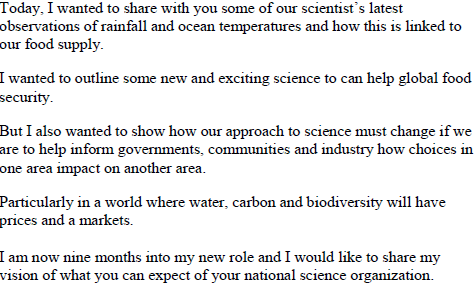|
|
|
|
|
|
|
News & Views item - October 2009 |
![]() CSIRO's CEO, Megan Clark, is Interviewed on Sunday Profile.
(October 27, 2009)
CSIRO's CEO, Megan Clark, is Interviewed on Sunday Profile.
(October 27, 2009)
This past Sunday the ABC's Monica Attard interviewed CSIRO's Chief Executive Officer, Megan Clark on the network's half-hour Sunday Profile spot.
Click here to access the podcast or read the transcript.
This extended interview together with Dr Clarke's
address to the National Press Club![]() last month on September 30 gives an indication of the individual that now heads
the nation's premier public scientific research organisation.
last month on September 30 gives an indication of the individual that now heads
the nation's premier public scientific research organisation.
She told her September 30 audience:

Dr Clarke emphasised the work CSIRO is doing on monitoring and modelling Australian and international climatic fluctuations and most particularly as it will effect the massive increase in the production of food. She said: "We are working with our research partners to extend this work [the most comprehensive and technically challenging water modelling project ever undertaken in Australia] to the river basins of Northern Australia, southwest WA and Tasmania. This means Australia will lead the world in building a national model of its water."
She then opined: "I believe that similarly we need to take on the challenge of building a national picture of our carbon footprint and assessment of future energy options. The approach will require not only the best multi-disciplinary teams of scientists from CSIRO and our Universities, but also our best economists from places like the Treasury and ABARE, Federal and State policy makers the community and industry."
Dr Clarke spoke in generalities and made no comment regarding what steps would be taken to attract and retain the best possible researchers and support staff to the organisation.
In her ABC interview Ms Attard was keenly interested in learning from Dr Clarke if the CSIRO scientists who worked on the wireless application which has so far won CSIRO about $200 million would benefit monetarily. Dr Clarke dodged the question.
Ms Attard also tried to pin down CSIRO's chief executive on just how long a leash its researcher had to publicly state their opinions:
Monica Attard: So when those
four scientists put in personal submissions to a senate enquiry into the
government's Carbon Trading Scheme early this year, when the CSIRO had decided not to take part in the enquiry.
They said that the government scheme to cut greenhouse gas emissions wouldn't
achieve even a limited level of protection against climate change. Despite the
obvious embarrassment that might cause to the government, that presumably is
exactly what you would want to hear CSIRO scientists expressing, would it not
be?
early this year, when the CSIRO had decided not to take part in the enquiry.
They said that the government scheme to cut greenhouse gas emissions wouldn't
achieve even a limited level of protection against climate change. Despite the
obvious embarrassment that might cause to the government, that presumably is
exactly what you would want to hear CSIRO scientists expressing, would it not
be?
Megan Clark: It's not our role to talk on policy and there's a very good reason for that.
Monica Attard: But they weren't talking policy, they were talking science.
Megan Clark: Well, and much of what ... much of what the team was talking about, much of what they presented and reminded that panel was in fact the science, the rate of change etc. And we need to get that science out there. It's one of the reasons why we aggregated our climate science and have got that out in a new publication now available on the web. So much of what the team was reminding that enquiry was the scientific basis that really needed to be listened to.
Monica Attard: So you weren't embarrassed by the expression of their views?
Megan Clark: I certainly wasn't embarrassed by the reminding of the review panel of the importance of this science. As I said, it's not our role to talk on policy and we ...
And then a little later:
Megan Clark: The issue here of personal, private is when we do it in our area of discipline. Because from an Australian point of view, from a public point of view, if one of our scientists is talking about their discipline area there's no division between an individual and the organisation. So what we need to do is speak loudly as an organisation and encourage our scientists to speak as CSIRO scientists, and that's what I intend to encourage in the organisation.
Well, perhaps some muzzles are more muzzling than others but it wouldn't be surprising that at least some CSIRO researchers are not gonna be too elated by that last comment and it may not do too much for attracting and keeping the best and brightest.